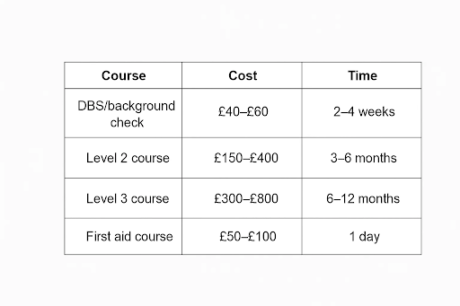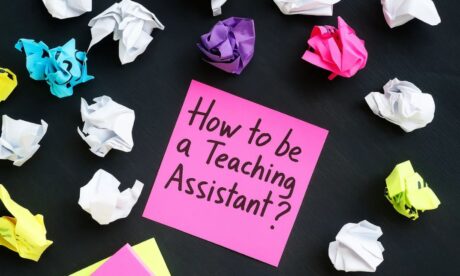Which qualifications do I need to become a teaching assistant? Schools typically require solid reading and maths skills along with a clear background check. Earning a Level 2 or 3 qualification can significantly boost your chances.
But remember, there isn’t one strict rule across the UK—every school decides what they need. Then, your main choices are Level 2, Level 3, and HLTA courses, and some need a placement while others don’t. If you’re brand new, don’t stress—you can start small by watching a class, volunteering, or taking a short safeguarding course. And yes, many trusted courses are online so that you can study at your own pace with tutor support.
This guide will help you through the basics, the best course levels, placement tips and online study help. Plus, we’ll share official links and a handy checklist later. So, take a deep breath, skim these quick points and then pick the Teaching Assistant Course that feels right for you—you’ve got this!
Which qualifications do I need to become a Teaching Assistant?

So, first things first—most schools want you to have basic reading and maths, a clean background check, and safeguarding clearance. Then, if you add a Level 2 or Level 3 qualification, your chances of getting the job go up a lot. Finally, don’t worry—we’ll guide you step by step based on your experience and what you want to do.
Minimum Requirements Most Schools Ask For
- Literacy & numeracy – can be proven with GCSEs or a skills test if your grades are old.
- Background check – shows you’re safe to work with children.
- Child-safety awareness – basic understanding of safeguarding rules.
- People skills – patience, teamwork, and communication.
Background & Safeguarding Checks
First, you’ll need a DBS check which ensures you’re safe to work with children. It’s done by your local council or an approved provider and usually takes 2–4 weeks. Next, make sure you have your ID ready to avoid delays. And finally, start the check early so it doesn’t slow down your application—you’ll feel much more relaxed knowing it’s done!
Skills Schools Value
- Communication – explain instructions clearly
- Teamwork – work well with teachers and other staff
- Patience – stay calm in challenging situations
- Organisation – manage resources and schedules efficiently
- Observation – notice pupils’ needs quickly
- Adaptability – adjust easily to changes
If You Have No Experience Yet
Don’t worry if you’ve never worked in a school before—you can still get started. First, try asking to observe a classroom so you can see how things work. Then, think about volunteering at a school or community project to get some hands-on experience. Next, take a short safeguarding course to learn the basics and show schools you’re serious. Finally, grab a reference from your placement or volunteer work—it really helps boost your application and gives you a confidence boost too!
Cost & Time Snapshot

Simple Path by Goal
- Primary School: Start with a Level 2 or 3 Certificate. It’s a great way to get classroom experience and feel confident.
- Secondary School: Next, try a Level 3 Award or Certificate. It helps you support older pupils and focus on specific subjects.
- SEN / One-to-One Support: Then, go for a Level 3 Diploma. It prepares you for specialist roles and helps you make a real difference.
- Early Years / Nursery: Finally, begin with a Level 2 Certificate. It’s perfect for working with little ones and learning the basics.
Which TA Course Level Should I Take?

Choosing the right teaching assistant course depends on your experience, goals, and the type of support you want to give in schools. Here’s a simple guide for each level:
Level 2 Award in Support Work in Schools
If you’re starting, this course is a great first step. To begin with, it teaches you the basics of helping pupils and supporting classroom routines. Additionally, it usually doesn’t need a placement, so you can get started without feeling stressed. Finally, employers see it as a good starter qualification, and it’s the perfect stepping stone if you want to move on to Level 2 Certificate or Level 3 courses later.
Level 2 Certificate in Supporting Teaching and Learning
If you want real hands-on experience, this course is a great choice. First, it includes practical classroom units, so you’ll need a placement. Then, you’ll learn how to support lessons and take part in everyday classroom activities. Finally, employers really like this course because it shows you can use your skills in real situations. Plus, it’s a solid step if you want to move on to Level 3 courses later.
Level 3 Award in Supporting Teaching and Learning
If you feel confident and ready to learn more, this course is a great choice. First, it focuses on knowledge. That’s why most often you don’t need a placement. Next, you’ll explore advanced ways to support pupils, plan activities, and understand SEN. Moreover, employers value it more than the Level 2 Award because it shows you really understand classroom support. Finally, it’s an excellent step if you want to move on to the Level 3 Certificate or Diploma.
Level 3 Certificate in Supporting Teaching and Learning
If you want real hands-on classroom experience, this course is perfect. To begin with, it requires a placement, so you’ll spend time helping in lessons every day. Next, you’ll learn how to support groups, manage classroom tasks, and gain confidence in day-to-day teaching. Furthermore, employers really value this course because it shows you can put your skills into action. Finally, it’s a great next step if you want to move on to the Level 3 Diploma or HLTA.
Level 3 Diploma in Specialist Support
If you want to focus on SEN or one-to-one support, this course is perfect. First, it has a heavier workload, so be ready to spend a bit more time studying and practising. Then, you’ll learn how to support individual pupils, handle special needs, and use advanced classroom strategies. Moreover, you’ll gather evidence from your placement to show you can put your skills into action. Finally, employers really value this course for specialist roles, and it’s a great step toward senior TA positions or HLTA.
Level 4 / Higher Level Teaching Assistant (HLTA)
If you’re an experienced TA and ready for more responsibility, HLTA is a great choice. First, it helps you build leadership skills and take on extra classroom duties. Then, you’ll learn to plan lessons, support assessments, and manage groups of pupils confidently. Moreover, completing HLTA can lead to higher pay and recognition at work. Finally, it’s the perfect step if you want to move into senior or specialist teaching assistant roles.
Short SEN Add-Ons That Boost Your CV
- Autism Awareness – Helps you understand and support autistic pupils
- Behaviour / De-escalation – Manage challenging behaviour calmly and safely
- EAL / ELL Support – Assist pupils in learning English effectively
- Communication / Visual Supports – Improve learning for all pupils clearly
How to Pick the Right Level
- Brand new to schools: Start with the Level 2 Award – perfect for beginners
- Confident or already helping in classrooms: Go for the Level 3 Award or Certificate – builds deeper skills
- Already in a role or aiming higher: Choose Level 3 Diploma or HLTA – for senior or specialist positions
Accreditation & Recognition Checklist
- Regulated level shown – Make sure the course shows its official level
- Named awarding body – Check who awards the qualification
- Employer recognition stated – Ensure employers accept it for roles
- Assessment method clear – Know how your skills will be tested
- Verifiable certificate – Confirm you’ll get a certificate you can prove
Do I need to be in the classroom to obtain the qualifications?

Courses You Can Complete Without a Placement
Some TA courses don’t need a placement, for example, the Level 2 Award and Level 3 Award, which are mostly knowledge-based. As a result, you can often study from home or online. However, it’s still a good idea to try a classroom observation if you can, because it helps you see how real lessons work and gives you a taste of school life.
Courses That Require a Placement
Some TA courses need a placement because they focus on real, hands-on experience. For instance, the Level 2 Certificate, Level 3 Certificate, Level 3 Diploma, and HLTA all include time in a classroom. During this time, you’ll collect evidence of what you can do, like helping with lessons, supporting pupils, and managing classroom tasks. Furthermore, this practical experience is highly valued by employers because it shows you can use your skills in real school life.
Already Working in a School?
If you already work in a school, you can use your daily tasks to help with your course. To start, match what you do, like supporting lessons or helping groups, to your qualification needs. After that, ask your line manager if you can do extra observations or try new duties for more evidence. In this way, you gain skills, build confidence, and make the most of your current role.
Volunteering Ideas If Jobs Are Tight
- Reading groups – help pupils improve their reading skills
- Breakfast or after-school clubs – support activities before or after lessons
- Mentoring – guide pupils one-to-one or in small groups
- Holiday schemes – assist with school holiday activities
- Community tutoring – help children in the local community with learning sessions
Can I complete my qualifications online?
What an “Online Course” Includes
- Video lessons – watch and learn at your own speed
- Tutor support – get help when you need it
- Assessments – check your understanding as you go
- Upload portal – submit your work easily online
- Response times – know when to expect feedback from tutors
Online or In-Person Courses: Which Suits You
Online Courses
Studying online is great because you can learn from home at your own pace. However, you need self-discipline. Also, you may feel less connected to teachers and classmates.
In-Person Courses
In-person courses give hands-on experience and immediate support from teachers. You also meet other learners. On the downside, schedules are fixed, and travel may take time.
Tech and Study Time Each Week
You’ll usually require about 5–8 hours per week to study for online courses. To begin with, make sure you have a stable internet connection and a basic laptop or tablet. Then, find a quiet zone where you can focus without distractions. By following these steps, studying becomes easier and you’ll feel more confident keeping up with your course.
Red Flags When Choosing a Provider
- Unclear accreditation – check the course is officially recognised and approved
- No tutor support – ensure you can get help whenever needed
- Vague assessments – make sure it clearly explains how your work will be graded
- Unrealistic timelines – avoid courses that move too fast or demand too much too soon
4-Week Study Plan to Get Momentum
- Week 1—Setup & Safeguarding: First, prepare your study space, gather all materials, and complete any initial safeguarding or DBS checks.
- Week 2—First Modules + Observation: Next, start your first course modules and, if possible, observe a classroom lesson in action.
- Week 3 – Mid-Course Tasks + Reflection: Then, work on your assignments and reflect on what you’ve learned so far.
- Week 4 – Portfolio Tidy + Reference: Finally, organise your portfolio, finish any outstanding tasks, and collect references or feedback to show your progress.
After You Qualify: Get Hired Next
- CV Headline: Show your role and course level clearly
- Three Short Points: Highlight key skills and achievements from your course
- Safeguarding Note: Include your DBS or safeguarding clearance
- Two References: From placements, volunteering, or previous work
- Where to Apply: Check school websites, local council portals, district sites, or recruitment agencies
Check out providers like Unified Course—they offer Teaching Assistant Courses at more affordable prices. Moreover, our courses are CPD-certified, affordable, and include a free PDF certificate. In addition, you get lifetime access, so you can study at your own pace and efficiently fit learning around your schedule.
FAQs
- What qualifications are required for a teaching assistant?
Basic literacy, numeracy, DBS/safeguarding check, plus Level 2 or 3 helps.
- Can I be a TA without qualifications?
Yes, beginners can start with volunteering or a short safeguarding course.
- What is the best qualification for a teaching assistant?
Level 2 for starters, Level 3 for recognition, HLTA (Level 4) for senior roles.
- How much does a TA earn per hour?
Teaching assistants usually earn around £10–£15 per hour. It depends on your experience and location.
- Can I be a TA with no experience?
Yes! You can start as a TA with volunteering, a short safeguarding course, or classroom observation.
- What’s the difference between a TA & RA?
TA supports school pupils; RA works on research projects, usually in universities.
Final Thoughts
Which qualifications do I need to become a teaching assistant? Now you know the answer. Most schools expect basic literacy and numeracy, a clean background/DBS check, and safeguarding awareness. Completing a Level 2 or Level 3 course can really boost your chances, though each school sets its own requirements.
At the same time, if you’re curious about what teaching assistants earn, check out our blog article: How Much Do Teaching Assistants Earn? to get all the details.




